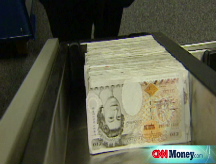Dollar mixed against currencies
Greenback gains on pound but weakens against euro, Japanese yen as investors weigh weak U.S. economic data.
NEW YORK (CNNMoney.com) -- The U.S. dollar gained against the pound but fell against the euro and yen Thursday as investors were confronted with grim data from the housing and labor markets.
The euro gained 0.08% to $1.3011 from $1.2974 late Wednesday.
The pound fell 0.54% to $1.3876 from $1.3948 late Wednesday.
Against the yen, the greenback slipped 0.52% to ¥89.05 from ¥89.27.
Weak economic news put pressure on the dollar versus the yen, which has surged as investors seek safety in the low-yielding currency.
U.S. housing permits and starts both fell to record lows in December as the number of Americans filing for first-time unemployment benefits rose last week to a 26-year high. And software-maker Microsoft Corp. (MSFT, Fortune 500) announced it is cutting to 5,000 jobs.
However, the greenback is gaining against the British pound.
"Worries about euro stability and the U.K. banking sector helped support the dollar," said Sacha Tihanyi, currency strategist at Scotia Capital in Toronto. But those concerns "may be settling down a bit in light of the potential uses of second ranch of TARP funds," he added.
Last week, President Obama secured access to the second half of the $700 billion Troubled Asset Relief Program, or TARP, which is meant to help aid ailing banks.
Still the positive sentiment came against a back drop of ongoing concerns about the health of the global banking system.
The pound has been battered this week on news of a second U.K. bank rescue plan. The bailout, announced Monday, is aimed at protecting banks against further losses and guaranteeing bank assets backed by mortgages and other loans.
Huge losses from Royal Bank of Scotland (RBS) also have investors worrying about the health of the banking sector and the possibility of further government intervention.
Adding to traders' worries was a speech by Bank of England Gov. Mervyn King on Tuesday, in which he said the British economy may retract in the first half of 2009. King also said monetary policy alone - raising and lowering interest rates - will not be sufficient to boost the economy.
At the same time, traders are concerned about the European economy after the European Commission said the euro-zone economy will likely shrink 1.9% this year, and Standard & Poor's downgraded Spain's AAA credit rating.
The dollar has generally been in an upward trend against European currencies for the past several months, especially as the economic situation in Europe has deteriorated. Furthermore, for many, the dollar still holds the "world's currency" title, and risk-averse traders plow into the dollar in times of trouble.
"Traders believe the U.S. is likely to see the light at the end of the tunnel before the U.K. and certainly before the euro zone," said Neil Mellor, currency strategist at Bank of New York Mellon in London. "This is risk aversion and flight to quality, no question about it."
In the current trading pattern, the dollar has fallen against the yen when it is up against the euro - and the dollar has risen against the yen when it is down against the euro. Traders tend to borrow the yen to fund investments in higher-yielding currencies, but when those currencies weaken, and investors reverse their positions, they are forced to buy back the yen, raising its value.
CNNMoney.com staff writers David Goldman and Ben Rooney contributed to this report. ![]()




